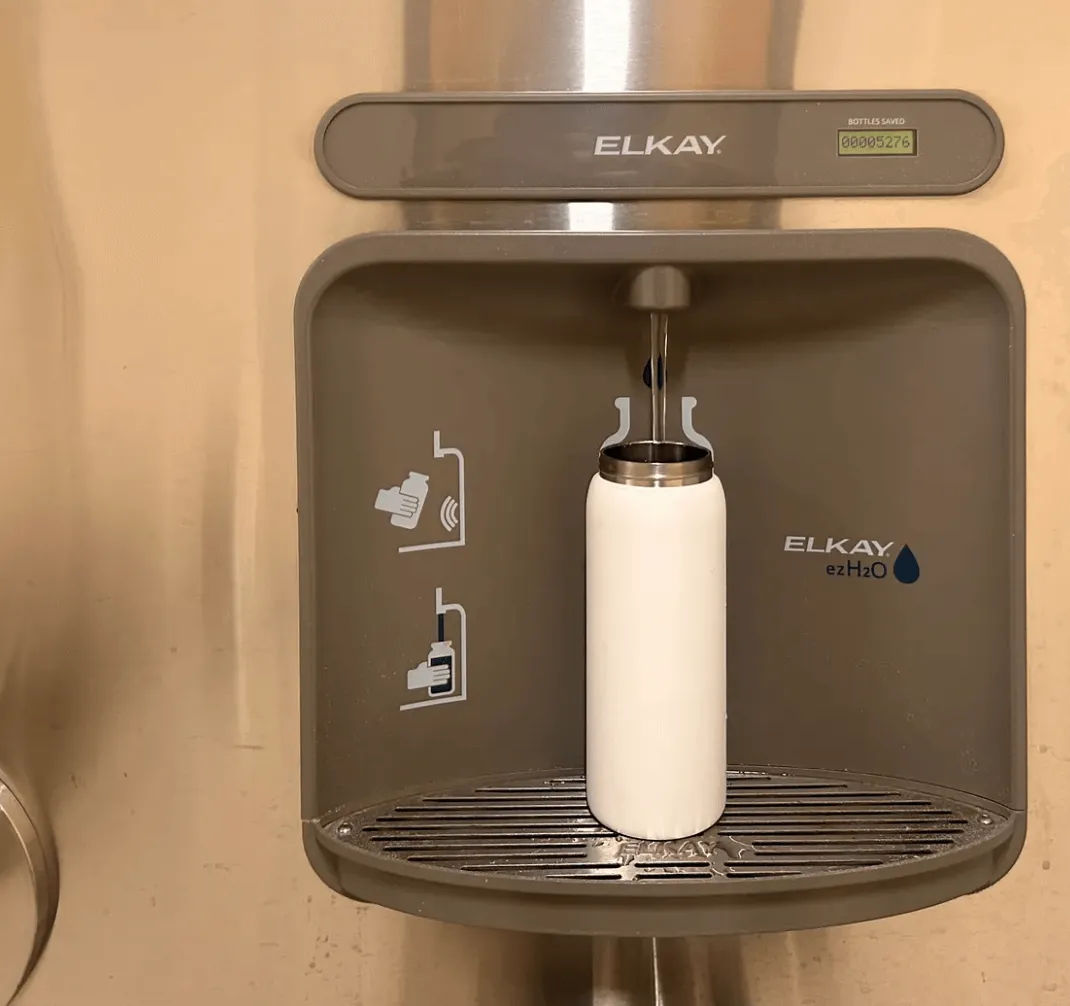Editor's note: This story first appeared in Medium in February, 2025. Since then, the project described below has been accepted as a funded project in 2025 by the Sustainable Campus Fund.
Amelia Church is a freshman Environmental Studies major at UVM and first learned about the Sustainable Campus Fund (SCF) through her Climate Change I class, when Caylin McCamp, interim director of the Office of Sustainability, gave a presentation on the program.
“The best ideas come from things that you’re frustrated about,” McCamp stated during her presentation. Church noticed that “there’s not enough places to fill my water bottle…and I couldn’t buy water bottles anymore because I know that University doesn’t sell plastic water bottles.”
In 2013, the University of Vermont was one of 22 campuses that had fully banned plastic water bottles and installed 75 water bottle filling stations around campus. Church acknowledged that “there was a lot of frustration in the dorms,” concerning water bottle filling stations. In Marsh, Austin, Tupper (MAT), there is only one water bottle filler for all the residence halls, occupied by 423 students.
“It’s really inconvenient. You can’t even get a Brita in there”, Church noted, highlighting the University’s gap in filling station placement. This widespread frustration on campus led Church to take action through the SCF.
The University of Vermont has continued its commitment to sustainability through funding the SCF, which allows students and staff to address the climate crisis through their own projects. Created in 2008 and previously named the “Clean Energy Fund”, the SCF has evolved to being dedicated to reducing the University’s impact on climate change, raising around $230,000 a year from a $10 fee/student/semester.
The SCF follows the three pillars of sustainability: social equity, ecological health, and economic viability. Projects that align with these initiatives can vary from “renewable energy, transportation, recycling”, and much more.
The SCF has supported a myriad of projects that have helped improve the University’s sustainability for current and future students. For example, in 2023 UVM purchased five electric vehicles: two being used by the Physical Plant Department to “maintain campus,” as well as one each given to The College of Agriculture and Life Sciences, the Rubenstein School of Natural Resources, and Transportation and Parking Services. This initiative was funded by the SCF and is the start of the University’s investment into electrifying their transportation.
Church reached out to SCF coordinator, Caylin McCamp, who connected her with two other students to work with who noticed the same issue: East Underwood, a junior Sustainability, Ecology, and Policy major, and Matisse Arnone, a sophomore Environmental Studies major. McCamp helped them turn this idea into a proposal to submit to the SCF.
“Dorms are our priority on the project. We’re first focusing on the Redstone campus,” Church explained.
Church’s team’s project addresses sustainability, health, and accessibility issues at UVM. By installing more water bottle fillers, “people will be more hydrated,” Church notes, and will not have to rely on their disposable filter systems, especially when students are outside their dorm room. The project goal is to get the stations installed over the upcoming summer, and completed by fall, making more convenient water access for upcoming and current students.
The process of applying to the SCF is meticulous, yet rewarding. McCamp guides students through the application process, and she sent the team an outline for the proposal, which is the first of a three-step process. Then, the team has to present the proposal in front of the SCF board, it gets reviewed, and concieveably chosen. The due date for this semester’s proposals is March 7th: there is still time for students to submit their ideas and create change!
Church affirms that the SCF is, “a really good opportunity,” and that students, “don’t just have to sit in their frustrations.” While many students may feel that they cannot make change with a campus of 12,000 students and the overwhelming climate crisis, the Sustainable Campus Fund allows students to directly engage in creating a greener campus. Church notes that “the school wouldn’t exist without students, and so you have so much power…the school relies on you a lot more than you think. It’s really important that everyone does their part of making our school more sustainable.”
